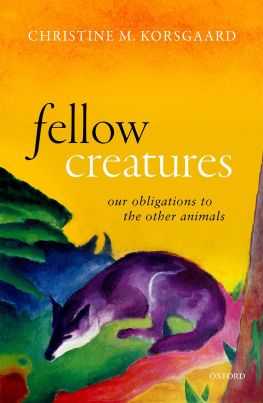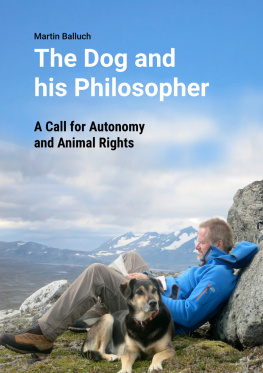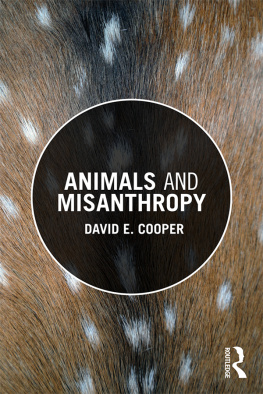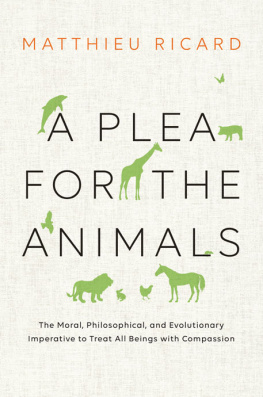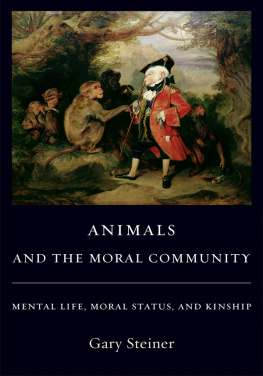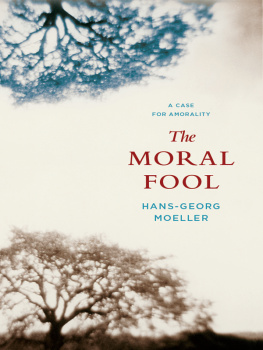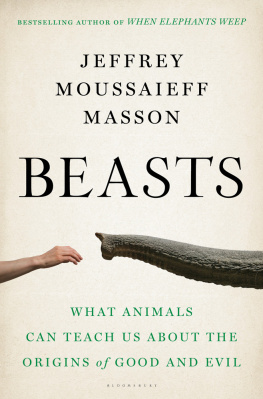Uehiro Series in Practical Ethics
General Editor: Julian Savulescu, University of Oxford
Choosing Children
Genes, Disability, and Design
Jonathan Glover
Messy Morality
The Challenge of Politics
C. A. J. Coady
Killing in War
Jeff McMahan
Beyond Humanity?
The Ethics of Biomedical Enhancement
Allen Buchanan
Ethics for Enemies
Terror, Torture, and War
F. M. Kamm
Unfit for the Future
The Need for Moral Enhancement
Ingmar Persson and Julian Savulescu
The Robust Demands of the Good
Ethics with Attachment, Virtue, and Respect
Philip Pettit
Why Does Inequality Matter?
T. M. Scanlon
Why Worry About Future Generations?
Samuel Scheffler

Great Clarendon Street, Oxford, OX2 6DP, United Kingdom
Oxford University Press is a department of the University of Oxford. It furthers the University's objective of excellence in research, scholarship, and education by publishing worldwide. Oxford is a registered trade mark of Oxford University Press in the UK and in certain other countries
Christine M. Korsgaard 2018
The moral rights of the author have been asserted
First Edition published in 2018
Impression: 1
All rights reserved. No part of this publication may be reproduced, stored in a retrieval system, or transmitted, in any form or by any means, without the prior permission in writing of Oxford University Press, or as expressly permitted by law, by licence or under terms agreed with the appropriate reprographics rights organization. Enquiries concerning reproduction outside the scope of the above should be sent to the Rights Department, Oxford University Press, at the address above
You must not circulate this work in any other form and you must impose this same condition on any acquirer
Published in the United States of America by Oxford University Press 198 Madison Avenue, New York, NY 10016, United States of America
British Library Cataloguing in Publication Data
Data available
Library of Congress Control Number: 2017958459
ISBN 9780198753858
ebook ISBN 9780191068386
Printed in Great Britain by Clays Ltd, St Ives plc
Links to third party websites are provided by Oxford in good faith and for information only. Oxford disclaims any responsibility for the materials contained in any third party website referenced in this work.
For:
Alexandria
Pepper
Lucy
Diotima
and
Cleo
Contents
In this book I defend the claim that we human beings are obligated to treat all sentient animals, that is, all animals who have subjective experiences that are pleasant or painful, as what Kant called ends in themselves, at least in one sense of that notion. I also try to say something about what those obligations are, for like most people who write about this subject, I think that the way human beings now treat the other animals is a moral atrocity of enormous proportions. But the book is also about some of the philosophical perplexities that I now think make this subject fascinating. When I became a vegetarian many years ago, it was for moral reasons, but they did not strike me as being philosophically interesting enough to write about. I thought it was obvious that you need a good reason to kill an animal, and that since we do not need to eat meat, we do not have one. In a way, the central issue still seems almost that simple to me. As I will argue, we take the things that are good for us to be good absolutely, both in the sense that we take them to be worthy of pursuit and in the sense that we take them to be the legitimate basis for making claims on other people. When we come to understand why we do that, we see that we are committed to the view that every creature for whom things can be good or bad has moral claims on us.
My argument is framed by two philosophical commitments: to the basic correctness of Kants account of why we have obligations, and to a particular theory, derived from Aristotle, about why some things are good and some badthat is, why there is such a thing as good and bad at all. The elements of my own view can be found in .
Along the way to explaining my position, I raise questions about how human beings are different from the other animals, whether human beings are more important than the other animals, and whether we are in any sense superior to the other animals. I ask what it means to have moral standing and what sort of thing can have it, and how exactly pleasure and pain are related to things being good or bad. Although I end up agreeing with the utilitarians about which creatures have moral standing, my views on the two issues I just mentioned are very different from theirs, as I explain in
It is one of the perennial problems of trying to write about philosophy that you are haunted by the idea that your reader will not really understand anything you say until after she has understood everything you say. Although the other chapters in this book of course draw on the ideas presented in how we are to understand what is bad about a species going extinctis resolved.
By the time you reach a certain age in philosophy, the burden of your intellectual debts is so heavy that you cannot face writing acknowledgments without a profound sense of inadequacy. What I say here will necessarily be selective, probably arbitrarily so. I first tried to write about how you could make a Kantian case for duties to animals when I was invited to give the Tanner Lecture at Michigan in 2004. Some of the research for the book was done under the auspices of a Mellon Distinguished Achievement Award that I held from 2006 to 2009. I am profoundly grateful to the Mellon Foundation for providing the time. I produced a somewhat distant ancestor of the present book in a series of lectures I called Moral Animals, delivered as the David Ross Boyd lectures at the University of Oklahoma in 2007. The present book most immediately comes out of the Uehiro Lectures I delivered at Oxford in 2014. I would like to thank those institutions for the opportunities they provided me, and the audiences of those lectures, as well as the many other audiences on whom I have tried out my views on animals and my more recent views on the good. In 2011, Dale Jamieson organized a workshop on my views on animals, where I got useful feedback from Beatrice Longuenesse, Peter Singer, and Jeremy Waldron. In 2015, Andy Reath organized an enormously helpful workshop on part of the manuscript of this book with his colleagues at Riverside. Andy also provided me with extremely helpful written commentary and encouragement. Peter Godfrey-Smith helped me with the sections in which I talk about what a species is. Michael Kessler served as a very able research assistant when I first began to look into this area. Byron Davies skillfully proofread the manuscript. Aleksy Tarasenko-Struc both helped with the proofreading and provided useful written comments. I would also like to thank the students who took my course Animals and Ethics in 2015 and 2016. For personal discussions of my views about animals, I would particularly like to thank Melissa Barry, Charlotte Brown, Andy Reath, Tamar Schapiro, and Jonathan Vogel. I will restrain my desire to personally thank all of the pets Ive ever had, and all of the sparrows and squirrels who have dined at my feeder over the years, for sharing my life and for making me think. Instead I will settle for dedicating this book to just a few of them, the cats who have been the home companions of my adult life.

